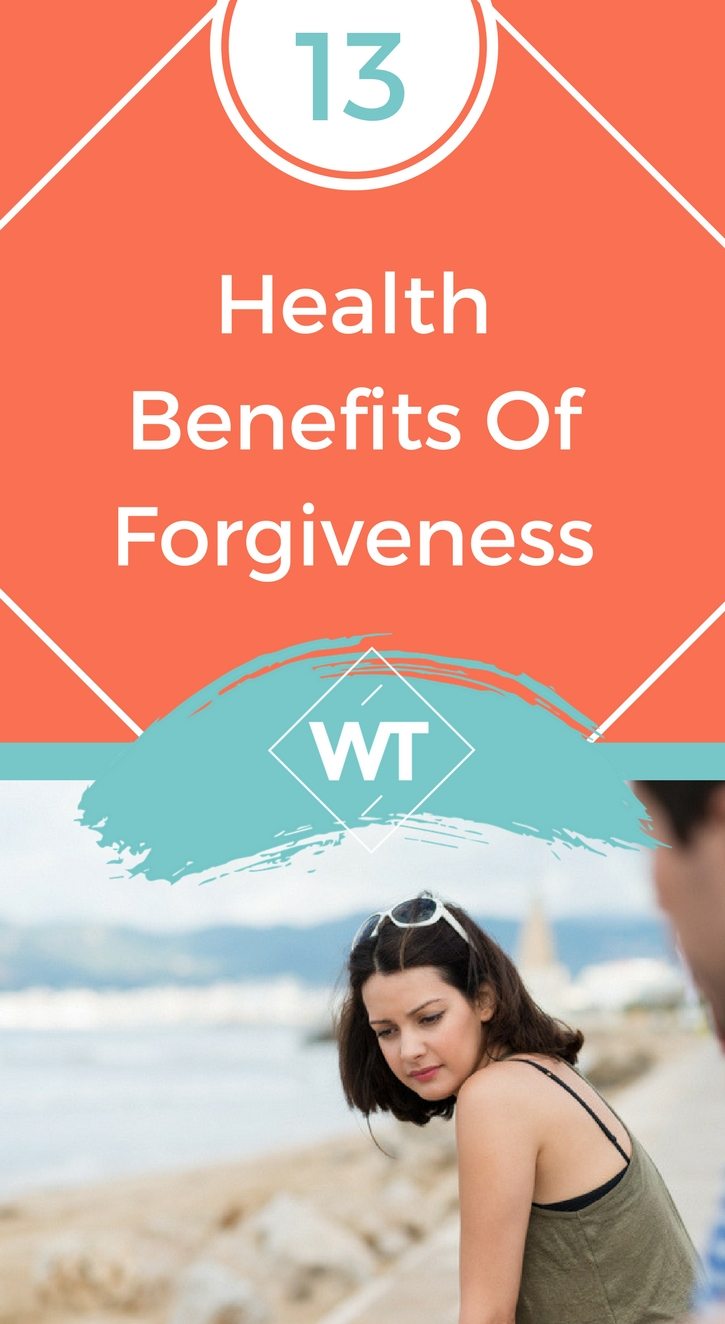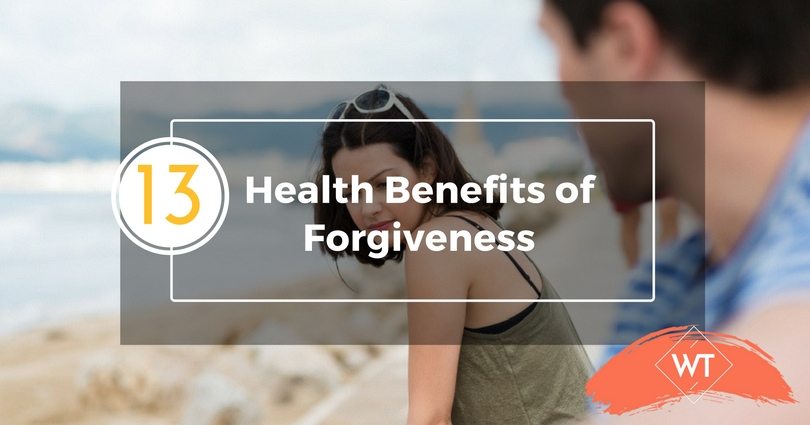13 Health Benefits of Forgiveness

Perhaps you are considering forgiveness for yourself or others, but you’re not sure if it’s worth the emotional work. You might prefer to ignore the painful memories and keep going about your day-to-day business. You’ll deal with it later, right?
But not forgiving has its costs. When we keep grudges and grievances, we retain everything that goes with them: anxiety, irritability, anger, depression, weight gain or loss, lack of trust in ourselves and others, insomnia, addictions . . . the list is long and full of despair. Do you really want to keep all that? Probably not.
So let’s look at some of the health benefits you can expect if you choose to forgive. The medical research I present here comes from hospitals and universities that study traditional forgiveness. With an expanded version (available in this blog series and in Forgive and Be Free, my book on forgiveness), the benefits will only go deeper into your body, heart and mind, because of the spiritual connection you’ll receive through the practice.
What are the health benefits of forgiveness?
Medical researchers have become interested in studying the effects of forgiveness as a healing process. Evidence is mounting that holding onto painful memories and bitterness results in long-term health problems. Forgiveness, on the other hand, offers numerous benefits, including [1]
1. Lower blood pressure
When we no longer feel anxiety or anger because of past grievances, our heart rate evens out and our blood pressure drops. This normalizes many processes in the body and brings us into coherence with our heart and circulatory system.
2. Stress reduction
Forgiveness eases stress because we no longer recycle thoughts (both consciously and subconsciously) that cause psychic stress to arise. By offering our burdens to Spirit for healing, we learn how to leave irritation and stress behind.
3. Less hostility
By its very nature, forgiveness asks us to let go of hostility toward ourselves and others. Spontaneous hostile behavior, like road rage and picking a fight for no reason, goes down as our commitment to forgiveness goes up.
4. Better anger-management skills
With fewer and fewer burdens from the past weighing us down, we can have more self-control when we do get angry. We’ll be better able to take some breaths, count to ten, take a time-out or get some exercise—rather than strike out at someone in anger.
5. Lower heart rate
Forgiveness relaxes our hearts because we’ve let our pain ease out of our system as an offering to God. Our hearts can calm down, and our heart rate decreases as a result.
6. Lower risk of alcohol or substance abuse
This is a big one. I feel this is one of the biggest and best reasons to jump into a forgiveness practice without delay. Substance abuse is a mask for underlying pain. Forgiveness helps us release that pain and find the gifts in our situation instead.
7. Fewer depression symptoms
Similar to lowering substance abuse, this is a crucial issue for many people. Depression is debilitating and can lead to suicide. On the other hand, forgiveness gives us healing and grace, and can replace depression with a sense of purpose and compassion.
8. Fewer anxiety symptoms
Almost everyone needs to forgive him or herself as well as others. Anxiety often arises when we fear that we’ve done something wrong. Our guilty conscience causes anxiety at a deep level. Forgiveness helps us to love ourselves deeply, relieving us of inner pain.
9. Reduction in chronic pain
Physical pain often has a psychological cause. When we allow a profound shift to happen with forgiveness, we heal ourselves on both psychological and physical levels. Thus, chronic pain can be reversed and we can come back to health.
10. More friendships
When we’re no longer holding grudges, we can get a lot closer to friends and family. Old relationships have a chance to change and grow, and new relationships can enter—all because we made room for them with forgiveness.
11. Healthier relationships
When we make forgiveness a regular part of our spiritual practice, we start to notice that all of our relationships (with lovers, co-workers, bosses, neighbors, etc.) begin to blossom. There’s far less drama to deal with, and that’s a huge bonus in life.
12. Greater religious or spiritual well-being
Whether you’ve chosen a religion or not, forgiveness will bring you closer to Spirit. When we ask God for help and offer our fear, sadness and pain as a prayer, we receive peace and divine love in return. This is true healing.
13. Improved psychological well-being
By releasing our grievances, we become more harmonious on all levels. Nightmares recede and exciting new life visions become commonplace. We feel calmer, happier and ready to give compassion and love to our world.
A good life, full of quality relationships, service to others and fun, is something that most of us hope for without ever knowing how to create it.
Looking at the list above, it’s easy to see that if you had lower stress, hostility, blood pressure and chronic pain, you’d be happier in your life. Also, if you had healthier relationships, improved psychological well-being and greater spiritual connection, you’d really be living a life of joy and purpose.
[1] : From the Mayo Clinic. See http://www.mayoclinic.org/healthy-living/adult-health/in-depth/forgiveness/art-20047692
Forgiveness and your health
The health benefits of forgiveness are plenty. In a study at Virginia Commonwealth University, researchers found what we might already know as common sense. They wrote,“Chronic unforgiveness causes stress. Every time people think of their transgressor, their body responds. Decreasing your unforgiveness cuts down your health risk. Now, if you can forgive, that can actually strengthen your immune system.” [2]
Dr. Bernie Siegel, well-known writer, surgeon and retired medical professor at Yale University, stated, “I have collected 57 extremely well-documented so-called cancer miracles. At a certain particular moment in time they decided that the anger and the depression were probably not the best way to go, since they had such little time left.
And so they went from that to being loving, caring, no longer angry, no longer depressed, and able to talk to the people they loved. These 57 people had the same pattern. They gave up—totally—their anger, and they gave up—totally—their depression, by specifically a decision to do so. And at that point the tumors started to shrink.” [3]
Forgiveness lowers cortisol and boosts immune function. You’ll feel more relaxed and centered, and you won’t get sick as easily once you’ve let go for good with forgiveness.
[2]: See the work of Dr. Everitt Worthington at Virginia Commonwealth University : http://www.people.vcu.edu/~eworth
[3]: See the work of Dr. Bernie Siegel: http://www.berniesiegelmd.com
Adding forgiveness to your life
Stay tuned for more blog posts about how to forgive places inside you that don’t feel peaceful, be they difficult memories from long ago or something that is going on now. Any area of your world can be affected by suffering and helped by a deep letting go of the past.
Take a look at this list to see if you could benefit from less stress and more inner serenity in these areas of your life:
- Your Physical Health
- Relationships with Loved Ones (Lovers, Spouse, Exes, and Friends)
- Family Issues with Parents, Siblings and Children
- Trauma from Childhood
- Impacts of Racism, Sexism and Other Isms
- Money Worries
- Sexual Issues
- Blocked Creativity
All of these parts of your life make one whole being: YOU. What remains in turmoil within you? Forgiveness can help. Give it a try!
Follow our FORGIVENESS series here . . .
1. Forgiveness – Your Path to Inner Freedom
2. 4 Common Blocks to Forgiving Someone
3. 13 Health Benefits of Forgiveness (this article)
4. How to Forgive Someone Even When It Feels Practically Impossible
5. Are You Waiting for an Apology Before You Forgive?
6. Are you Ready to Forgive?








Leave a Reply